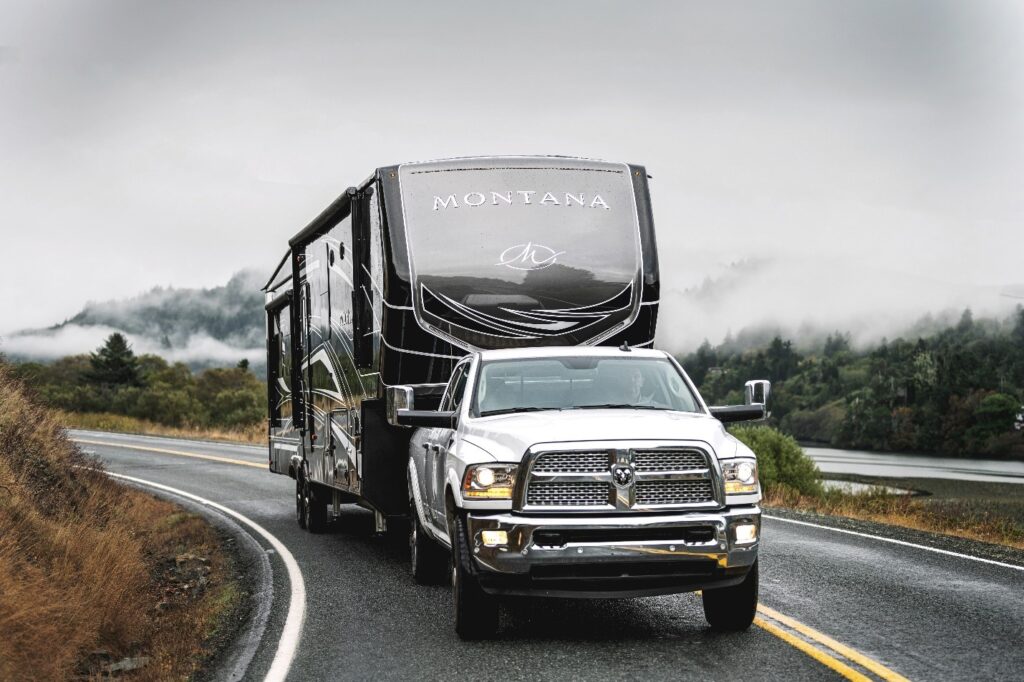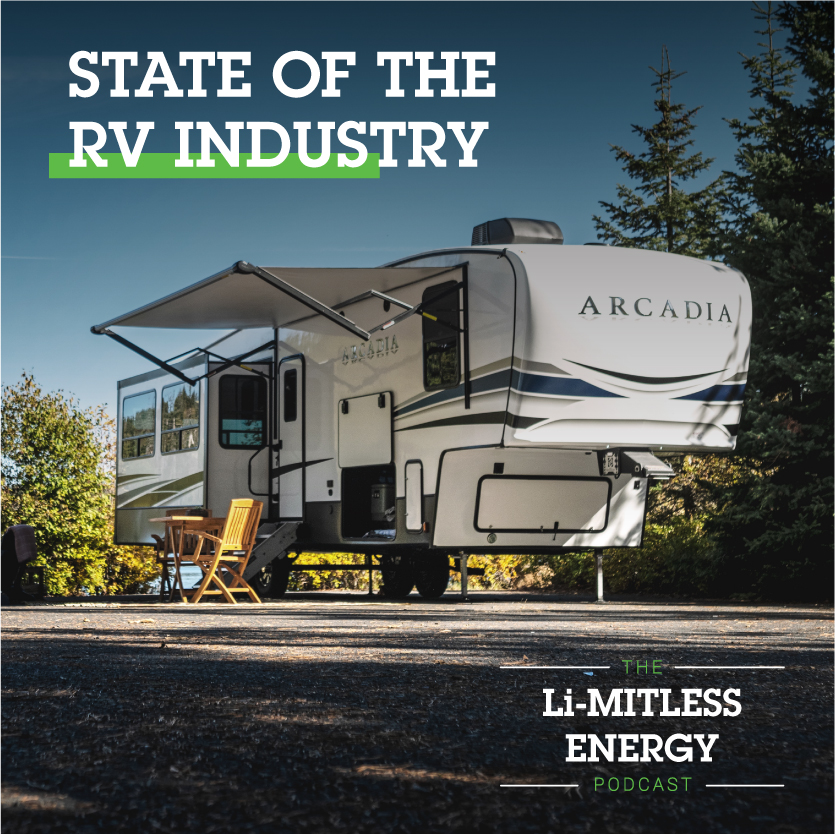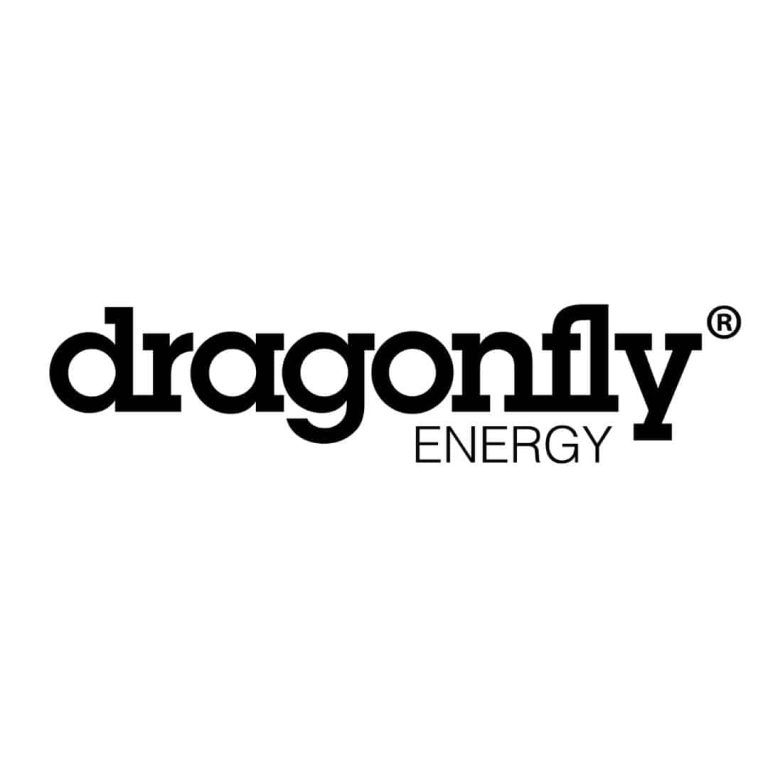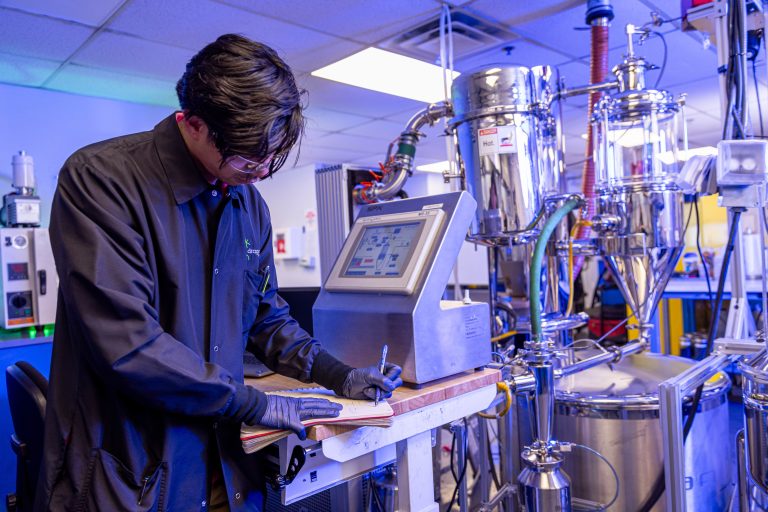On a recent episode of the Li-MITLESS ENERGY Podcast, COO Todd Woelfer of THOR describes the shift in the century-old RV industry. As technologies continue to develop, brand-new features are added, and innovation and electrification increase, the RV industry has reached a turning point that will fundamentally redefine the traveler’s experience.
Innovation and Electrification Redefine the RV Industry

Since purchasing Airstream Inc. in 1980, THOR has continued to acquire various brands of recreational vehicles (RVs) and buses. Today, the THOR Family of Companies is the world’s largest manufacturer of recreational vehicles. With over 15 of the most recognized manufacturers in the RV world, THOR has grown to represent a major portion of the RV market. Their commitment to continuous innovation and investment drives them to pursue top-of-the-line technology in all sectors. Striving to enhance the customer experience in the global RV market, THOR creates products that deliver the experience today’s owners seek and tomorrow’s RVers dream of.
In this episode of the Limitless Energy Podcast, host Denis Phares interviews Todd Woelfer, the Chief Operating Officer of Thor, at the RV Super Show in Tampa. They discuss the current state of the RV industry and the challenges it is facing due to macroeconomic issues and changes in consumer demand. Despite these challenges, Woelfer highlights the resilience of the RV consumer and the positive sales numbers seen at recent shows. However, he also acknowledges the increased pressure on consumers due to rising prices and interest rates. Overall, this episode provides valuable insights into the RV industry and its response to the current economic climate.
Listen to the full episode or watch the recording on our YouTube channel and be sure to keep up with Thor through their Instagram, Facebook, YouTube, LinkedIn, and Website!
Podcast Transcript
Denis Phares: 00:00
Hi, I’m Denis Phares, and this is The Li-MITLESS ENERGY Podcast, and we are here in Tampa at the RV Super Show. Today I’m here with Todd Woelfer, Chief Operating Officer of Thor. Thank you for coming on today.
Todd Woelfer: 00:26
Thanks, Denis, for having me here.
Denis Phares: 00:28
So, this is an interesting time. We have come off a couple years of an absolutely booming industry. And we, would you call it a wall that we’ve hit or temporary trough here.
Todd Woelfer: 00:41
We’ve certainly hit a slowdown, right. And we’re facing, you know, macroeconomic issues that our consumers are facing right now driven by Fed policy that is designed to kind of quell demand, right? And it’s done exactly that. And certainly, the RV space is often one of the first spaces to feel that those kinds of… “The Bellwether” Yeah, absolutely. We’re the Bellwether. And so, we’ve felt that. What’s been really impressive, though, is the resilience of the RV consumer. The shows early this year have been very favorable in terms of people coming out. People buying and the activity around the shows, you know, like this show, you know.
Denis Phares: 01:27
There’s a lot of enthusiasm.
Todd Woelfer: 01:28
It’s crazy. So 17% higher sales than the prior pre-sale record from 2019. Really, which was during that boom time that you’re talking about. So, this year, we’re expecting the show in Tampa, just to be you know, packed. So, it’s a great sign for us. But the consumer is under that kind of pressure. And it’s on the industry to sort through, you know, what we can do to kind of alleviate that. And we’ve seen prices creep up just because component costs have gone up. We’ve seen interest rates go up. So, consumers are facing an entirely different buying proposition than they had before. And finding ways to be creative to alleviate some of those challenges is really where OEMs should be focused right now. And I know that’s where Thor is focused, right?
Denis Phares: 02:18
I mean, interest rates, that’s the real killer for this sort of purchase. Right? I mean, that’s the whole Fed policy is, as you noted, directly aimed to quell demand, but is it disproportionate to the to this kind of purchase, do you think?
Todd Woelfer: 02:33
For sure, right? Nobody has to buy an RV. There are things in our lives that we have to buy. So, when… it is a high end discretionary item, and so when the consumer feels that kind of impact on their pocketbook, some of the first things that you know, they turn away from would be those discretionary purchases, and RV certainly fit into that mold. And our job right now is to make sure that we make clear to the buyer that the lifestyle, you know that the demand has not changed. It’s the willingness to make the buying decision that slowed down a bit. And our job on the OEM side is to do what we can to make that an easier decision for consumers. Because that lifestyle awaits them, once they make the decision to do it, right? Incredible family experiences, experiences with friends, you know, a choice that will change your life. And so, finding a way to make that buying proposition something more palatable to consumers during tough times, is where we need to be focused right now.
Denis Phares: 03:41
We’ve noticed a very similar thing in the lithium-ion battery business where the demand really hasn’t stopped. It’s just the buying decision has slowed down. Folks are still calling in, folks still want to design systems, but it’s like, oh, maybe I’ll buy half the system now and half later. And you know, that’s, there’s still a lot of interest. Right. And so, with, obviously, with the RV industry in this cycle, we know how the operations tend to change. Can you talk a little bit how the innovation changes? Is there more innovation and down periods? Or is it pretty steady?
Todd Woelfer: 04:17
Yeah, it’s a great question. Because the compulsion is, you know, you’ve got to manage the business prudently, you know, finances during slow times. And so, the compulsion is for spends like innovation or marketing and some of those things is to pull back. But right now is the worst time to do that. Because our…the innovation, the investment we’re making today, is going to reshape the customer experience, you know, in the next couple of years. And so, slowing that down only delays our opportunity, so we won’t slow down our investment in innovation. It’ll continue you know; we’ll funnel that money and that investment into strategies that are specifically designed to make the user experience better. You know whether it’s aligning with great partners like Dragonfly and their lithium-ion battery solutions, or electric RV chassis manufacturers that we’ve partnered with. And there’s just so many opportunities for us to elevate the customer experience. And so those investments that Thor has made will continue to be made.
Denis Phares: 05:27
Well, you know, selfishly we definitely appreciate the partnership between Thor and Dragonfly Energy. I want to talk a little bit about that, because when you talked a lot about ESG and the focus of Thor on ESG was Dragonfly part of that initiative?
Todd Woelfer: 05:45
Of course, right. So when Thor…when Thor, you know, the RV industry, and not just Thor, but all OEMs and suppliers, you know that ESG it has been something that’s been part of what, how we think about our business forever. If an outdoor company, like an RV company isn’t focused on sustainability, then I don’t know who would be right. So, we, when we, though formalize the strategy around ESG. And we looked at our suppliers and our potential partners, and a way for us to improve, you know, the footprint that we leave when we put products out into the space, Dragonfly was a natural solution for us, right and a natural partner for us. Which is why there were two reasons really, well three reasons. One, the sustainability reality of the products that Dragonfly sells. Two, Dragonfly was the right partner, because the way they think about the business, the way you guys think about what you’re doing. Last night’s product rollout was incredible, right? Where you…how you think about your business in different ways. And you’re thinking about how do you make this safer for people? How do you make it more user friendly, so that when they’re relying on batteries to run their RV, they can conveniently know exactly where they’re positioned as they look at their phone, and the system communicates with them and lets them know that. Those are big differences to alleviate anxiety. So, Dragonfly was an important partner for us when we looked at sustainability. As we look forward, you know, as we consider sourcing choices now, sustainability is at the top of the list about okay, how does this fit with our strategy on sustainability? It’s important to Thor and how we do business.
Denis Phares: 07:38
Well, I appreciate you saying that we did you know work hard on that on that product rollout. And we’re excited about it. We’re excited about the new, the new technologies and excited to get it into Thor products. So, let’s talk about Thor and you’ve got… is it 17 subsidiary companies?
Todd Woelfer: 07:56
Yes.
Denis Phares: 07:57
And you’ve got some of the most iconic brands under the Thor family. You’ve got Airstream and you’ve got Keystone. And of course, we’ve had a very close relationship for some while with Keystone. And we view Keystone as one of the most innovative. Especially for a company putting out that towable product to be going to a solar flex package and going standard with lithium. “Yes.” What’s your opinion? How do you I know you can’t say one against the other?
Todd Woelfer: 08:22
Well, no, the reality is so we’re sitting in an Airstream now. Every single time I walk into an Airstream It is awesome. Right? Airstream is unique, it’s different. It is iconic. And it’s something that’s set apart from the rest of the industry. But when you talk about Keystone, they are the world’s largest trailer manufacturer, right? They are, and you don’t get there and stay there without being the leader in the space. And so, when they partner and they brought the Dragonfly partnership to Thor, right, it wasn’t Thor bringing it to them it was the relationship that your team built with Keystone that opened Thor’s eyes to the opportunity. So that…and that, is how Keystone thinks about their business right? They’re always a step ahead of their competition and that’s why you know, year in year out, they are the largest supplier in the space.
Denis Phares: 09:20
So, there was the Tiffin acquisition that occurred as well, and Tiffin we’d also been working with Tiffin for years and you know we’ve viewed them as pretty advanced with their electrical systems and you know great to work with how has that been?
Todd Woelfer: 09:37
Incredible. So the Tiffin family, Lee Tiffin and now runs it. He is the grandson of the founder and an incredible operator who has really found his comfort operating within the Thor family of companies leveraging you know a bit of what Thor can help his you know Tiffin with you And we’ve seen that company prosper, he’s made some great choices lately as he, he’s brought that company back to its core, and they’re, they’re moving away from towables. And they’re gonna focus deeper into establishing more Class B opportunities across the portfolio, but Tiffin always had, right? They were high-end, best in class customer experience solutions, which is why, you know, a partnership with Battle Born makes sense for them, to have those kinds of solutions, you know, in the units as a difference maker for them. And Tiffin is, you know, was kind of that last piece of our North American portfolio, that really high-end player in that space. And when we were fortunate enough to align with Tiffin, and that kind of fulfilled our portfolio. And we feel really good about that. Partnerships been great. They’ve performed incredibly well. And what’s really important to long term Tiffin and users is they still do everything the Tiffin way. They’re still putting out top end quality products for their users. Thor didn’t go in and change anything we’re not, we don’t do… that’s not how we operate when we when we buy companies. We allow those companies to have their own identity and maintain the identity that made them successful. Where Thor comes in, is we might be able to help them with some capital, some partnership opportunities and some things like that, that elevate what the company does. But at its core, Tiffin is Tiffin.
Denis Phares: 11:31
But Thor is providing more in in terms of technology advancements. I mean Thor corporate; I’m talking…the Innovation Center, especially I mean, there is a pretty strong, and I would say unique push at Thor corporate to really figure it out, especially the electrification.
Todd Woelfer: 11:48
Yeah, absolutely true. So, five years ago, we started our enterprise level Innovation Center. And since we’ve started it, the investment that we have made, and the breadth of focus of the strategy from that group has, has increased every year, because…what an incredible time, right? We’ve got developing technologies, we’ve got emerging brand new technologies, and all coming at this industry that are going to fundamentally redefine the customer experience. And this is the time for Thor at the enterprise level to be making investments to help vet partners right, to help identify “Dragonflies”, you know, in partners that can make a difference in our user’s experience. And so that team led by McKay Featherstone has done an incredible job, right? We’ve, we’ve aligned with and are in communication with a number of electric chassis manufacturers, and we’re looking not just to buy an electric chassis, right? That, to Thor, that’s not a strategy. Our strategy is focused on how do you take the electric chassis that might be available from a manufacturer and make it uniquely better for the RV experience. And that’s where our innovation team comes in. And they’ve, you know, we’re engaging, we’re not just evaluating the product available from electric chassis manufacturers, we’re engaging with them and saying, “Okay, how could we make this better for RVers?”, and that, that’s gonna make a huge difference, right? And that, that’s that investment you talked about earlier. And innovation is why it’s important that we stay the course with that strategy, even through times like now.
Denis Phares: 13:35
As a battery manufacturer, we have always viewed the RV industry as not just a bellwether for the economy, but as a bellwether for how electrification is going to happen. Because these are folks that are already living off grid. And these are folks that already know how to live off of solar panels. And so, it’s been a great industry for us to be partnering with. And as this becomes more and more prevalent in RV’s and an Airstreams like this one, you can go and park and boondock it’s going to become more prevalent in, in stationary applications, which is, you know, obviously, as the battery manufacturer, we are looking to electrify everything, but ultimately, we want to see more storage everywhere, whether it’s mobile or, or stationary. So, you know, that’s the partnership with Thor is just absolutely huge for us. Yeah. So, your background is not technology, it’s legal. You…were you the Chief Legal Officer at one point.
Todd Woelfer: 14:34
Yeah, I came to Thor in 2012. Bob Martin was just about to be named CEO of the company. He was CEO at the time. And he wanted a General Counsel, and I interviewed with him… the strangest interview of my entire life that lasted five minutes and I was sure it went terribly bad. But it went really well. And so, I started as General Counsel with him in 2012. And, but even during that interview, that very short interview I had with him, I told him like I, I operate in the law, and I understand the law and how it relates to RV companies. And I can bring that value, but my real interest and passion is on the business side. And I don’t want to just be a lawyer. So, from the beginning, I was involved in parts of the business, but that’s grown over time. Bob is an incredible operator, and he has an extreme willingness to make sure people get where they belong, regardless of what their title might be, or, you know, what their experience might be, but where their value is, that’s where he puts his people. And over time, I kind of evolved into that role. And, you know, when we announced a year or so ago, that I was COO, it wasn’t a big shift, you know, in the job. Uh, you and I had met, I was working on that with you, and, and things like that had happened. And I was doing a lot of what I do today, just it…I had evolved into that role. We just kind of formalized it a bit when the title changed.
Denis Phares: 16:20
But with your background, and the changing, the changing structure of the vehicles… Is there, are there compliance issues that are important? Are there different regulations? I mean, what does your background bring to the change in the industry?
Todd Woelfer: 16:38
So, and the answer to your question is yes. Right. When you’re thinking about electrification, you’re thinking about all these new technologies. And you know, whether you’re talking about data privacy issues or just, you know, compliance issues, there is a constant monitoring from the legal compliance side of these technologies. We’re fortunate, we’re blessed, we’ve got a couple of people at Thor who are best in class, you know. We’ve got our Vehicle Compliance Manager, David Mahalik, is the best in the space. And he is deeply engaged with our innovation team on a regular basis. On the data side, we have Chris Lane, who’s our Data Protection Officer, who helps us and is also plugged in regularly with the innovation team. But you’re right, a lot of these emerging technologies trigger really challenging legal questions, and sorting through that, and making sure you do that the right way is part of the process. So yeah.
Denis Phares: 17:42
It’s not just the electrical standards part. But as you noted, the data part, like we want to know how you’re using your power. And I guess there’s privacy, you know, considerations there? And, yes, you know, the technology we’re rolling out, for example, it gives us the capacity to collect data. And if possible, we’d love to see the data, compile all the data and optimize how, you know, the electrical system works.
Todd Woelfer: 18:08
Right. And we’ve got to make sure we do that within the confines of the growing number of data protection laws across the US. Yeah. Yeah. And that that’s the challenge, right? Because the data, the data for the purpose of improving the experience, is, is a great use of the data, right? Data for the purpose of, you know, incessant marketing efforts, and everything else is not something consumers, you know, are fans of, and it is something that the laws and, in a growing number of states, protect against. So being careful and making sure you do that the right way and fully compliant is an important part of all innovation that we’re doing a thorough right now.
Denis Phares: 18:54
But ultimately, you see it headed in that direction?
Todd Woelfer: 18:59
Oh, absolutely. You…we have to, right? You know, understanding where that data, used for improving product performance, and therefore, improving the user experience, that, that’s when data is at its best, right? And, and so they’re absolutely, that’s part of how we think about it, and how we are approaching it. We’re being very careful to keep our compliance teams plugged in as we go along the way, because you don’t want to go too far down one path and figure out it’s not a viable solution.
Denis Phares: 19:35
Right. Yeah. So, Thor is already the world’s largest manufacturer of RVs.
Todd Woelfer: 19:42
Yes.
Denis Phares: 19:44
So, the latest acquisition Airxcel is a little bit different. And I don’t know how much you want to talk about this. But where do you see, as you’re already the largest player, where do you see the expansion of Thor? How does that work out?
Todd Woelfer: 20:00
Yeah, I think, you know, the RV industry and the outdoor industry, in a broader sense, has a number of opportunities for Thor, as we look ahead. When you think about the Airxcel acquisition, our industry has outstanding suppliers. But they’re relatively few in number. And making sure as we went through the pandemic, and the challenges of that time, we saw firsthand, you know, and lived firsthand the struggles of a limited supply chain. And, and part of our strategy was to identify opportunities to strengthen that. And, and that could mean a number of different things. And when the Airxcel opportunity arose, it meant that to us, that we believe because Thor is not, you know, we do not have a strategy of vertical integration. We did not buy Airxcel and make it a supplier exclusively to Thor. Airxcel, supplies the entire industry on even terms, there’s no special Thor treatment. And, and we did that to make sure the industry had a viable supplier, as an alternative. And that was important to the industry, it was important to Thor, and that’s why we did it. As we look ahead, our growth opportunities, you know, as you pointed out, we’re the largest manufacturer in the world. So we were in Europe, and we have opportunities there. You know, we’re watching the markets there and the impact from the war and everything else. And so, there’s, there’s some process there for the macroeconomic realities to kind of normalize and fall in line and be a little bit more favorable right now. We just can’t get chassis over there. You know, but once that market starts to normalize as it will, our, our company over there Erwin Hymer Group is incredibly well situated. And there are a number of growth opportunities there to be sure. And then back in the States, the potential for supply chain other aspects or ancillary opportunities around the RV space. Those are all on our radar.
Denis Phares: 22:20
Well, I think you’re one of the busiest guys in the industry and I know you’re on a tight timeline. So, I just want to thank you so much for stopping by today.
Todd Woelfer: 22:28
I appreciate it. Denis. Thanks for having me and Thor appreciates the partnership with Dragonfly. Thank you.
Denis Phares: 22:35
That’s gonna do it for today. I’d like to thank my special guest Todd Woelfer, Chief Operating Officer of Thor. Be sure to subscribe to us on any of your favorite podcast platforms.


